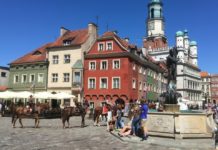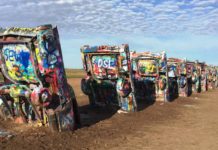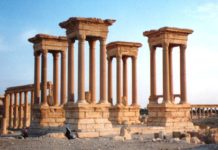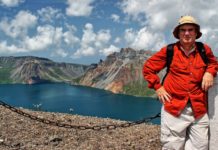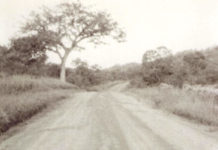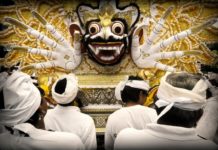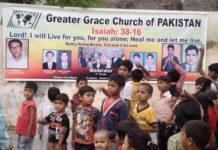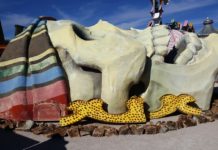CHAPTER 12
This ain’t no party, this ain’t no disco. This ain’t no fooling around – “Life During Wartime” by Talking Heads (1979)
After an unforgettable month and with visas for Sudan in our passports, Ted and I said goodbye to Cairo. We got on a train headed to Luxor and the Valley of the Kings where we planned to see the legendary tomb of Tutankhamun.
The farther south we went, the hotter it got. By the time we got to Luxor, it was 125 degrees, the highest temperature either of us had ever experienced in our lives. The streets were deserted for most of the afternoon. Everyone stayed indoors until the heat wasn’t quite as bad and a faint breeze drifted off the Nile River. At night, the city woke up and throngs of people poured out into the streets and filled the restaurants.
Naturally, Ted and I ignored the rules. During the worst time of the day, we rented bicycles and pedaled from our hotel to King Tut’s Tomb. When we got to the entrance, our faces were red and we were dripping with sweat. Seeing the Coca Cola sign at the Valley of the Kings’ souvenir shop made our day.
Since we’d come at the peak of the afternoon’s crushing heat, no one else was there. The entrance to the tomb was a long, narrow hallway no more than five feet high. Just like at the pyramids, one had to crouch down to walk the length of the corridor. At its end was the main room where explorers had discovered King Tut’s tomb and sarcophagus back in the 1920s. Complex hieroglyphics and drawings were etched into the walls.
While in Luxor, we visited Karnak, a gigantic historic religious site, strolled down the Avenue of Sphinxes, and toured the Luxor Temple. An assortment of aggressive con artists and hustlers seemed to pop up everywhere we went. Whether it was a hotel, restaurant, or trinkets, they were eager to help us find it.
From Luxor, Ted and I took a train to Aswan to board a ferry to Sudan. Squeezed into a train car with some dreadfully poor travelers, the overnight rail trip was another hot, crowded, uncomfortable ride. Unexpectedly, a couple of hardy Westerners were crammed in with us, and we enjoyed passing the time with them.
Once we arrived in Aswan, travelers continuing to Sudan were herded like cattle to a tin-roofed hut that passed for the ferry terminal. It was there that we went through customs and immigration before getting on the boat. After boarding the old river steamer, Ted and I staked out a nice spot in a corner of the upper deck near some travelers who were Australian, Swedish, and Canadian.
“When the boat took a pause on Lake Nasser, the temptation to jump into the water was impossible to resist.”
On the morning of June 20, 1972, we sailed out of Aswan and headed for Wadi Halfa, an outpost in northern Sudan. Later I learned that wadi is an Arabic word meaning “valley” or “dry riverbed.” Judging by the map, it appeared to be precisely in the middle of nowhere.
The ferry sailed up the Nile River which flowed in the opposite direction as it made its way north to the Mediterranean Sea. Our boat went past the newly built Aswan Dam and continued south on Lake Nasser, the reservoir created by the dam’s construction. It came within close sight of the Abu Simbel temples, the huge ancient stone carvings that had been relocated during the building of the dam.
Ferry staff had urged passengers to buy water containers, use purification tablets, and not drink water from the river unless it had been boiled. After two tablets were dropped into a half gallon of water, it was necessary to wait thirty minutes before it was safe to consume. Because of the unbearably high temperatures, it was difficult to wait for the pills to work, and on the second day we began drinking unpurified water.
When the boat took a pause on Lake Nasser, the temptation to jump into the water was impossible to resist. Two of the Swedes decided to dive in, and I was right behind them. “God knows what will happen to me for drinking this water and swimming in it,” I thought as I plunged into the lake.
At the end of the third day on the Nile, the boat pulled into Wadi Halfa. Jutting out was a rickety piece of crumbling wood that served as the dock.
The landscape was flat, windswept, and totally barren. It could have been used as the surface of the moon in a movie. Weeks ago, when I had first set foot in the Spanish Sahara, I felt as if I had arrived in the Twilight Zone. Wadi Halfa easily surpassed that place in weirdness. A few shanties could be seen in the distance. Beyond that, there was nothing but the desert and the Nile River meandering into the horizon.
Passengers were quickly and rudely rushed over to an immigration zone, a structure nothing more than a plywood shack with a wide canvas door tied open to let the long line of passengers in to get their passports inspected.
The soldiers angrily shouted to everyone in Arabic and occasionally in English as they questioned the arrivals about why they were coming to Sudan. They treated all of us like we were a major pain in the ass. After getting through the checkpoint, the police pointed to a dilapidated bus that would take us to the train station.
“The sun, heat, and wind had burned our skin red; sand and dust covered us from head to toe.”
When I saw the train that was going on the three-day ride across the desert to Khartoum, I seriously wondered if it would be able to make the trip. The wooden boards on the side of the rail cars were rotted out, and most of the windows didn’t have any glass in them. If I didn’t know this was a functioning train, I’d have thought it had been abandoned in the desert long ago.
After boarding, we jumped on and tried to find a seat, but there wasn’t a good spot to be found. The benches were filled with adults, children, baggage, food, and various animals. With nowhere to sit, Ted and I threw down our bags in the small space between two cars and settled in for what promised to be a long, strange, and uncomfortable journey.
Once the train pulled out of Wadi Halfa, I dozed off for a while. When I woke up, the stagnant air was filled with an intolerable stench and the sweltering heat was unbearable. I felt like I was suffocating and being slowly roasted alive. Ted looked equally miserable.
“I don’t know how much more of this I can take,” I said.
At that exact moment, I noticed a handful of people scrambling between the cars and climbing up to ride on the top of the train. Ted and I swiftly joined them. To our amazement, dozens of others were already up there, and they looked pretty comfortable sitting on the roof of the slow-moving train.
Constant gusts of sand blew off the desert and into our faces. To protect us from the harsh conditions, we fashioned head and face scarves with our bandanas just like the locals.
Although we were fully exposed to the sun, it was a lot more tolerable than riding inside. As the train crept and creaked along the tracks, it was roughly following the winding path of the Nile River.
Occasionally, the train would stop at an improbable oasis in the middle of the desert. The isolated villages along the route presumably survived because of their location near the railroad tracks and the use of the Nile as a source of water.
Often, young children would race alongside the train with their hands out as we pulled in or out of the tiny communities. The kids would scream for money and beg for treats. A lot of passengers threw coins or scraps of food to them.
When Ted and I tried to buy something to eat at the stops, not much was available. Occasionally, we’d find a simple store where you might get a can of sardines. If we were lucky, we got our hands on something the locals called a fuul sandwich, which was a pita filled with beans and Nile perch. Halva, a sweet, tasty treat made from sesame seeds, was the one thing that was easy to find. I would buy it by the kilo and eat it until it made me sick.
Ted and I did not leave the top of the train until we reached Khartoum two and a half days later. The sun, heat, and wind had burned our skin red; sand and dust covered us from head to toe. We looked like desert nomads. Nobody seemed bothered by our appearance because so many of the others looked the same way. Everyone and everything was covered with a thin coat of sand.
Sudan’s capital was different from the other African cities we had visited. Except for the main streets in the center of town, paved roads were few and far between. The city’s small buildings looked very old, and shops with flimsy canvas awnings dotted the neighborhood. Rather than stay in their homes, people seemed to prefer to be outside in the shade where the air was cooler. Surely, they had no air conditioning.
The youth hostel was located on a dusty road near the edge of town and was nothing more than a small, one-story building on a fenced-in dirt lot. The beds were all outside; only the office and shower were inside. As it turned out, sleeping in a bunk bed underneath a tree wasn’t actually that unpleasant.
Incredibly, we met a kid who was from the famous Knickerbocker family of New York. He must have been extremely rich but was a hardcore traveler and had been all over Africa and most of the world.
At night, everyone sat around on their beds and talked, drank tea or soda, and swapped stories. Two carefree American guys named Gordon and Bob provided the entertainment. Gordon had a guitar, and, inevitably, a sing-along would start when he strummed and sang a Beatles song or another one that we all knew.
Among the dedicated hostellers were folks who had arrived from Ethiopia and others who had recently come from central Africa. A couple of hardy Australians told how they had crossed the Sahara Desert from Nigeria and traveled all the way through Chad to get to Khartoum.
“He warned that the ongoing civil war in southern Sudan made it too dangerous to pass through.”
Two guys at the hostel came from as far as South Africa. If we went there, they said, we could find work, enjoy the best surfing in the world, and smoke plenty of marijuana. It was exactly what Ted and I had envisioned for our journey.
During the day, we wandered around Khartoum, but there wasn’t much of interest. Ted and I decided to get our Ugandan visas and move on. Sudan had neither an American Embassy or an American Express office, so our mail had been delivered to the American Interests Section of the Spanish Embassy. The staff agreed to forward any future mail to our next destination: Kampala, Uganda.
At the American Interests Section, Ted and I met the U.S. Consul, a cool guy with long hair and a beard who was curious about our travels and shared some extraordinary stories of his own. When we told him that we hoped to hitchhike all the way to South Africa, he sat back in his chair, let out a slow whistle, and said, “Wow, that’s an ambitious plan.”
The Consul proceeded to explain that he had done almost the exact same thing on a motorcycle a number of years earlier. However, he warned that the ongoing civil war in southern Sudan made it too dangerous to pass through. On top of that, he advised us not to travel to Uganda because the president, Idi Amin, was known for not making Westerners feel welcome in the country. Flying to South Africa, the consul concluded, was the best option.
Although he tried to completely dash our dream, Ted and I decided to make the trip overland anyway. Somehow, we figured, we’d work it out.
“I’d been on the road for the better part of a year, and I was on the verge of being declared a criminal.”
When I collected my mail, I had a letter from home with a request from my dad to call him. I hoped he didn’t have bad news. The people at the American Interests Section told me that it wasn’t possible to call the United States, but they could receive a call that was placed to me.
Our friend, the Consul, assisted me in sending a telegram to my dad asking him to call me in Khartoum. The telegram had to be routed through the Director of Special Consular Services at the Department of State in Washington, DC. The process was complicated, and it made me realize what a remote spot I was in. Incoming calls to Sudan were only permitted during a short window of time. I scheduled a slot for my dad to call when it was midnight in California.

It was bizarre talking to my dad after such a long time, especially from the middle of Africa. Hearing his voice again was soothing, and it was a relief not to get any awful news. I was disappointed to hear how worried my parents were about my traveling in Africa. Besides my overall safety, they were concerned about my situation with the Selective Service.
My dad had been talking to our attorney, who was afraid that I had pushed things about as far as I could. He suggested that I consider registering as a conscientious objector. I’d been on the road for the better part of a year, and I was on the verge of being declared a criminal. I had finally run out of bullshit excuses.
Although I didn’t think there was any chance of being accepted as a conscientious objector, I told my dad that I would take the attorney’s advice. My father said he’d send the application to me immediately. I felt terrible that he was caught up in this mess, but I could tell that he was anxious to help me.
I didn’t want to become a lawbreaker or a fugitive with no country to call home. The thought of that really disturbed me. But I had known from the start that when I made my decision, there was a real possibility that it could turn out this way. If that’s how it was going to be, I still preferred it to the alternative.


